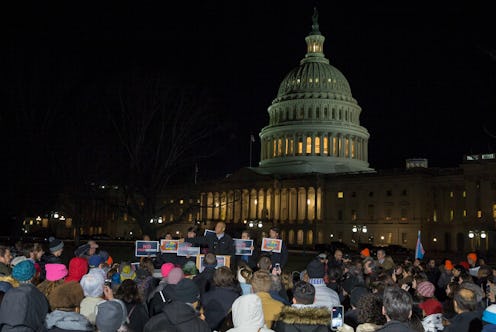News
Here's What It Means For The Government To Shut Down Now

Democrats and Republicans in the Senate could not come to an agreement on a short-term funding measure on Friday night, and for the first time since 2013, the government came to a grinding halt. While lawmakers returned to Congress on Saturday morning scrambling to settle on a deal over the weekend, here's what the government shutdown would mean for key government agencies and the crucial services that they provide to the public.
First of all, thousands of federal employees across several agencies and departments will be furloughed, and won't be required to report to work come Monday. Government services like the U.S. Postal Service, Social Security, and the Transportation Security Administration (TSA) will continue to operate — they're considered essential services — even though some of their employees will be on furlough. The U.S. Military, which is also deemed essential, will continue its operations both home and abroad, though some troops will not get paid until after the shutdown ends.
Typically during a government shutdown, services like national parks and zoos close down. This time, however, the Trump administration made it clear that national parks will stay open — but visitor centers will be closed, and trash will not be collected. According to Business Insider, conservation groups have expressed concern that opening parks but closing visitor centers would put both the public and the parks' resources in danger.
The people most immediately affected by the government shutdown will be those who are suddenly (temporarily) out of work, as well as people who rely on the government services. In 2013, low-income children attending the federally-funded Head Start preschools suddenly had nowhere to go when the government shut down. Those children also relied on the program for food and health care.
Federal contractors, who will be furloughed, will also be hugely affected. During the last government shutdown, low-wage employees like janitors and security guards who work in federal buildings had to take up part-time jobs as Congress figured out a solution to keep the government funded. The services affected by the government shutdown could also have disproportionately negative impact on women.
Both Republicans and Democrats are pinning the shutdown on each other. The short-term spending bill, which would have funded the government for another 30 days, had passed the House on Thursday night, but the GOP did not have the 60 votes in the Senate for it to pass.
At the center of the disagreement between both parties is the Deferred Action for Childhood Arrivals (DACA) program. Senate Democrats are refusing to pass any spending bill that does not include DACA protections, but President Trump has insisted that no DACA deal will be made if the bill does not include funding for his wall along the Mexico-U.S. border, which he has repeatedly vowed Mexico would pay for.
Attached to the short-term spending bill was funding for the Children's Health Insurance Program (CHIP), which provides health care to nearly 9 million low-income children across the country. In its repeated push to repeal Obamacare last year, Congress passed the deadline to fund CHIP, and Republicans included it in the spending bill as a way to garner Democratic votes. But as talks over DACA fell apart last week — in part thanks to Trump's reported comments about "sh*thole countries" like Haiti and El Salvador —, the spending bill's chances at passing shrank by the day.
This is the first time a government shutdown happened with a single political party in control of both chambers of Congress and the White House. On Saturday morning on the anniversary of his inauguration, Trump tweeted, "This is the One Year Anniversary of my Presidency and the Democrats wanted to give me a nice present," adding, "#DemocratShutdown"